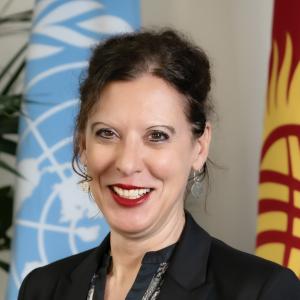Board Meeting of the UNPRPD Project "Advancing the Rights of Persons with Disabilities in Kyrgyzstan"
25 February 2025, 10 AM, Hotel Orion
Speech by Antje Grawe, UNRC in the Kyrgyz Republic
Dear Kiyal Zhanuzakova, Deputy Minister of Labor, Social Welfare and Migration,
Dear representatives of State institutions, partners from civil society and NGOs,
Dear Heads of UN agencies from UNDP, UNFPA and UNICEF, implementing this important project,
It is a privilege to be here with you today to review the achievements of the UNPRPD project Advancing the Rights of Persons with Disabilities in Kyrgyzstan and set priorities for 2025. I am proud to be here today and thankful to the UN agencies implementing this project which stands symbolically for the importance which the UN system in Kyrgyzstan attaches to inclusion and to advancing the rights of persons with disabilities in Kyrgyzstan.
At the heart of our work lies a fundamental principle: inclusion. Ensuring that persons with disabilities enjoy their full rights and participate as equal members of society is not just a matter of justice—it is essential for sustainable development, prosperity, and peace. This commitment is firmly embedded in the United Nations Charter, the Convention on the Rights of Persons with Disabilities (CRPD) and its Optional Protocol, as well as the Pact for the Future, adopted by world leaders at the Summit of the Future in September 2024, which was also attended by President Japarov.
Kyrgyzstan has made notable progress over the years. The ratification of the UN Convention on the Rights of Persons (CRPD) in 2019, the Accessible Country Program (2023-2030), and the establishment of the National Council for Persons with Disabilities mark important milestones. The UNPRPD project has played a key role in supporting legal reforms, improving data collection, and promoting meaningful participation of persons with disabilities in decision-making.
However, as the UN Special Rapporteur on the Rights of Persons with Disabilities will present in her report to be presented in spring 2025 to the UN Human Rights Council following her visit to Kyrgyzstan in September 2024, significant challenges remain. Despite constitutional protections, the absence of a comprehensive anti-discrimination law leaves many without effective legal recourse. Accessibility—whether physical, informational, or digital—remains inadequate, limiting access to education, employment, healthcare, and public life. Persons with disabilities, particularly women, children, and those in rural areas, continue to face stigma and exclusion. Strengthening legal frameworks, policy implementation, and enforcement mechanisms is essential to closing these gaps.
As we look to 2025, three key priorities emerge. First, legal reforms will need to be accelerated to fully align Kyrgyzstan’s laws with the CRPD. The shift from a medical model of disability to a rights-based approach is critical. This includes finalizing and adopting a Law on the Rights of Persons with Disabilities that guarantees legal capacity, access to justice, and equal opportunities. Ensuring that persons with disabilities and their representative organizations are actively involved in shaping these reforms is essential.
Second, accessibility and social protection will need to be strengthened. Investments in infrastructure, transport, and digital services must fully integrate universal design principles. Social protection mechanisms must be expanded to ensure independent living, financial security, and equal access to education, healthcare, and employment. Inclusive education and employment require not only policy adjustments but also practical measures, such as reasonable accommodation in schools and accessible workplaces.
Third, stronger data collection and accountability mechanisms are needed. Without reliable, disaggregated data, progress cannot be accurately measured, and policies cannot be effectively tailored. The upcoming Second Voluntary National Review (VNR) presents a key opportunity to strengthen data collection across all Sustainable Development Goals (SDGs), ensuring that disability inclusion is systematically tracked and addressed. Integrating international best practices, such as the Washington Group on Disability Statistics, will be critical for evidence-based decision-making. The National Council for Persons with Disabilities should be further empowered to drive policy coherence and implementation, ensuring that disability inclusion is mainstreamed across all sectors.
As my colleagues from UNDP, UNICEF, and UNFPA will outline in more detail, the United Nations remains fully committed to supporting Kyrgyzstan in advancing these priorities. The growing global focus on disability rights has strengthened the UN system’s approach, culminating in the United Nations Disability Inclusion Strategy, which provides the foundation and tools for supporting Member States in fulfilling their human rights, development, and humanitarian commitments. Through the UNPRPD project, the UN System will continue facilitating legal reforms, strengthening data systems, and amplifying the voices of persons with disabilities in shaping policies that affect them. We will further promote stronger institutional coordination and inclusive development, ensuring that its impact extends beyond its immediate timeline.
This is not just about fulfilling obligations—it is about shaping a Kyrgyzstan where disability inclusion is the norm, not the exception. Let us work together—government, civil society, the UN, and development partners—to translate commitments into concrete action. The principle of the CRPD Nothing About Us Without Us as well as the UN’s overall pledge of the 2030 Agenda for Sustainable Development to Leave No One Behind must guide every step we take. Inclusion is not an act of charity; it is a matter of justice. It is the foundation of a society where every person has the opportunity to reach their full potential.
Thank you.
Speech by


















